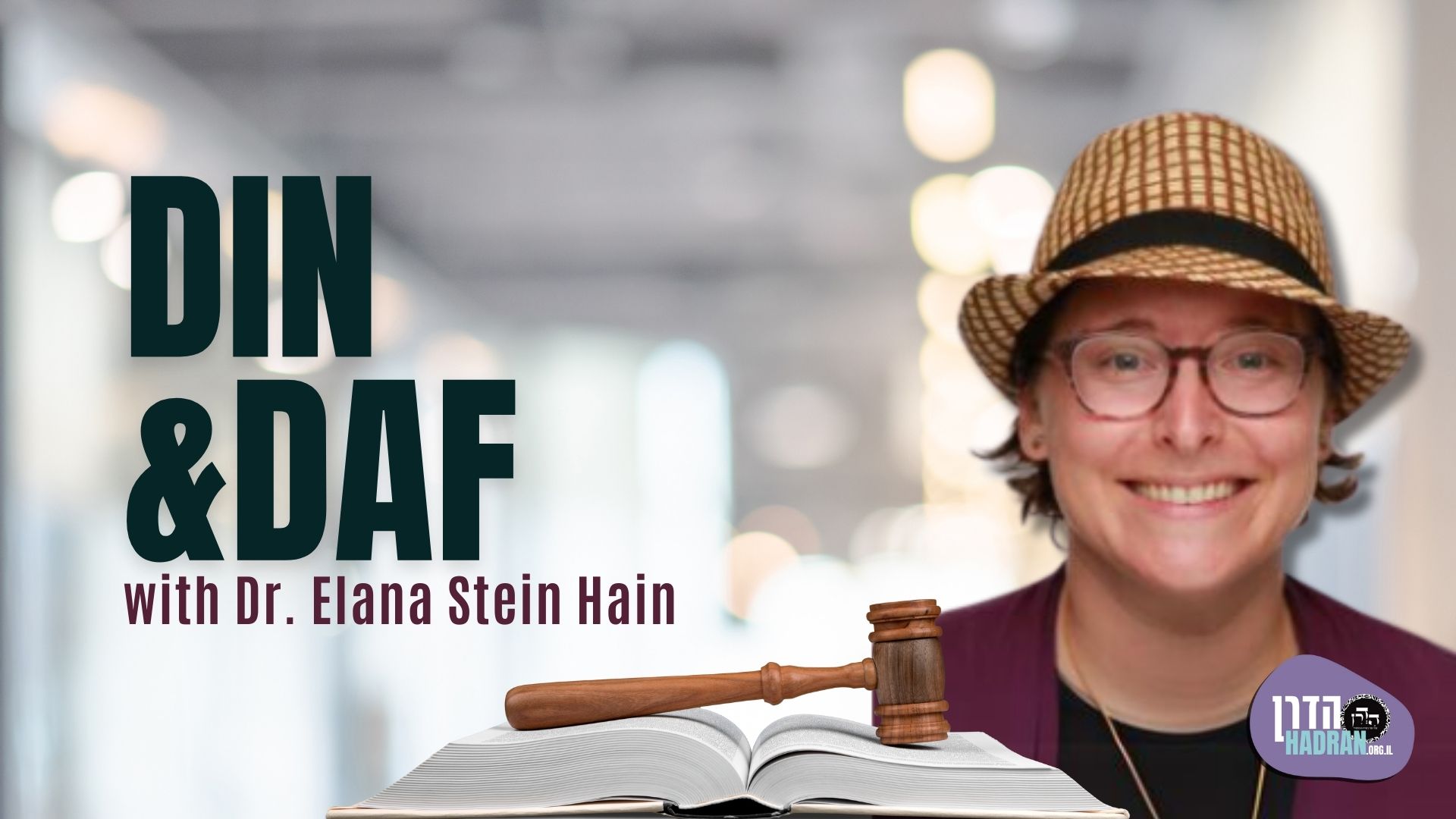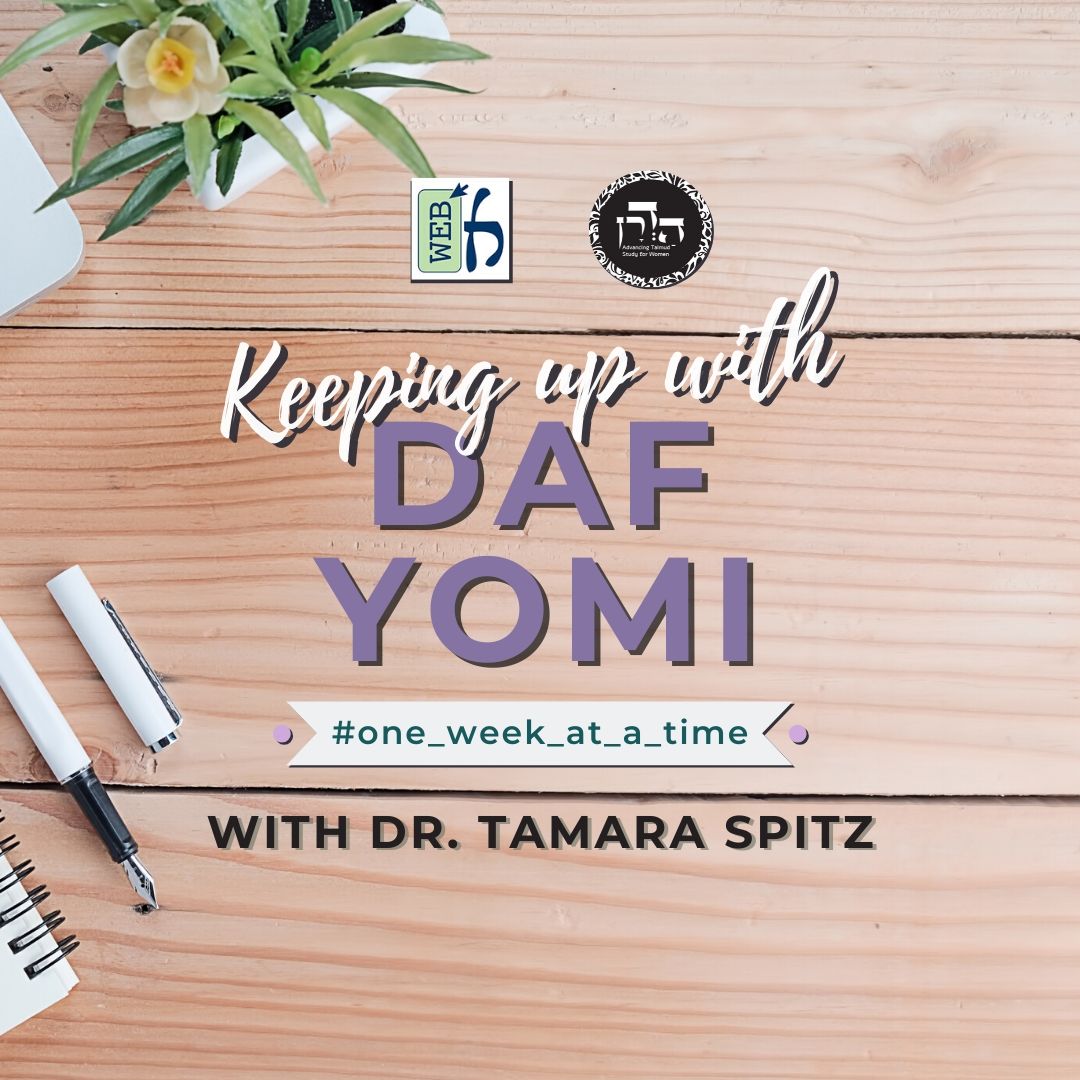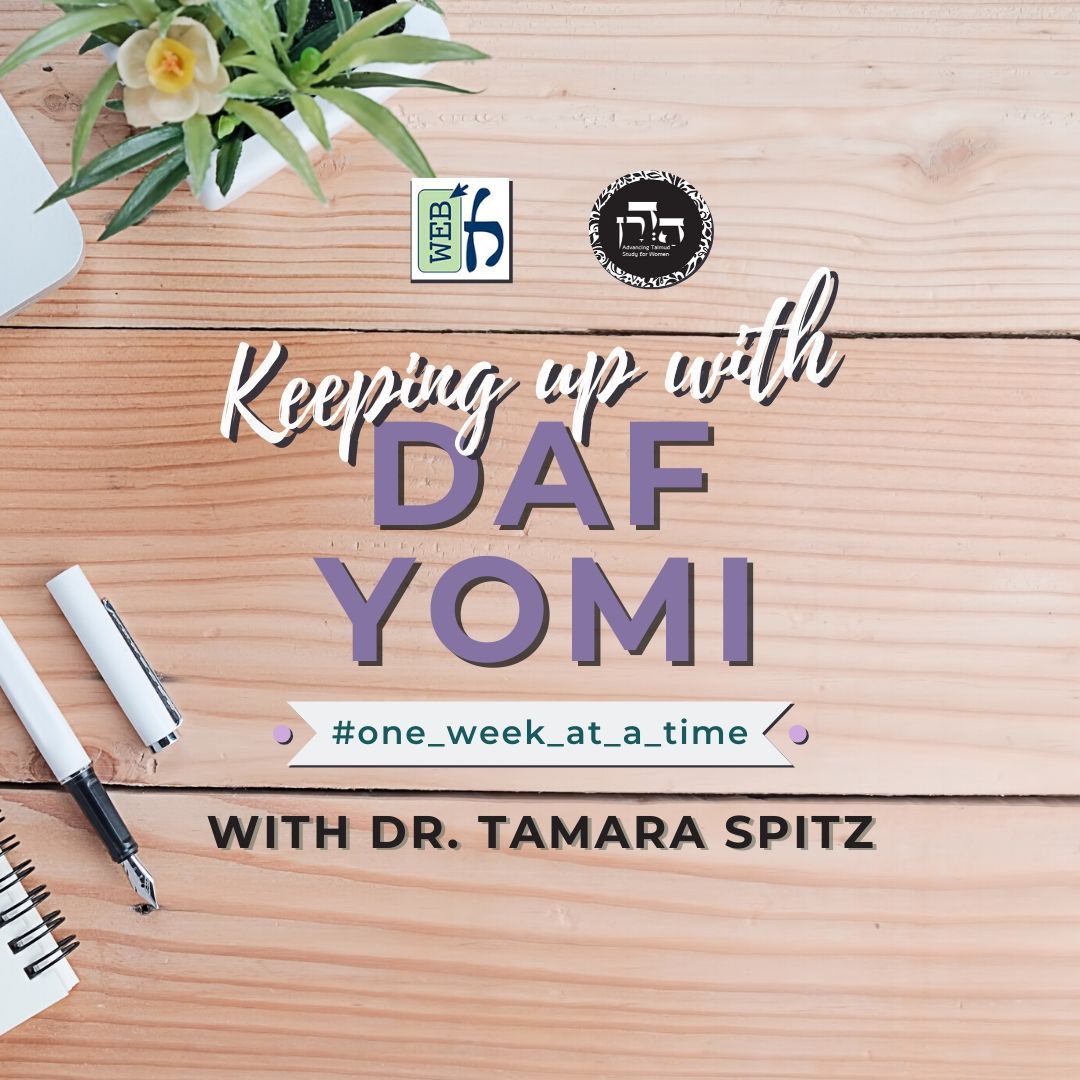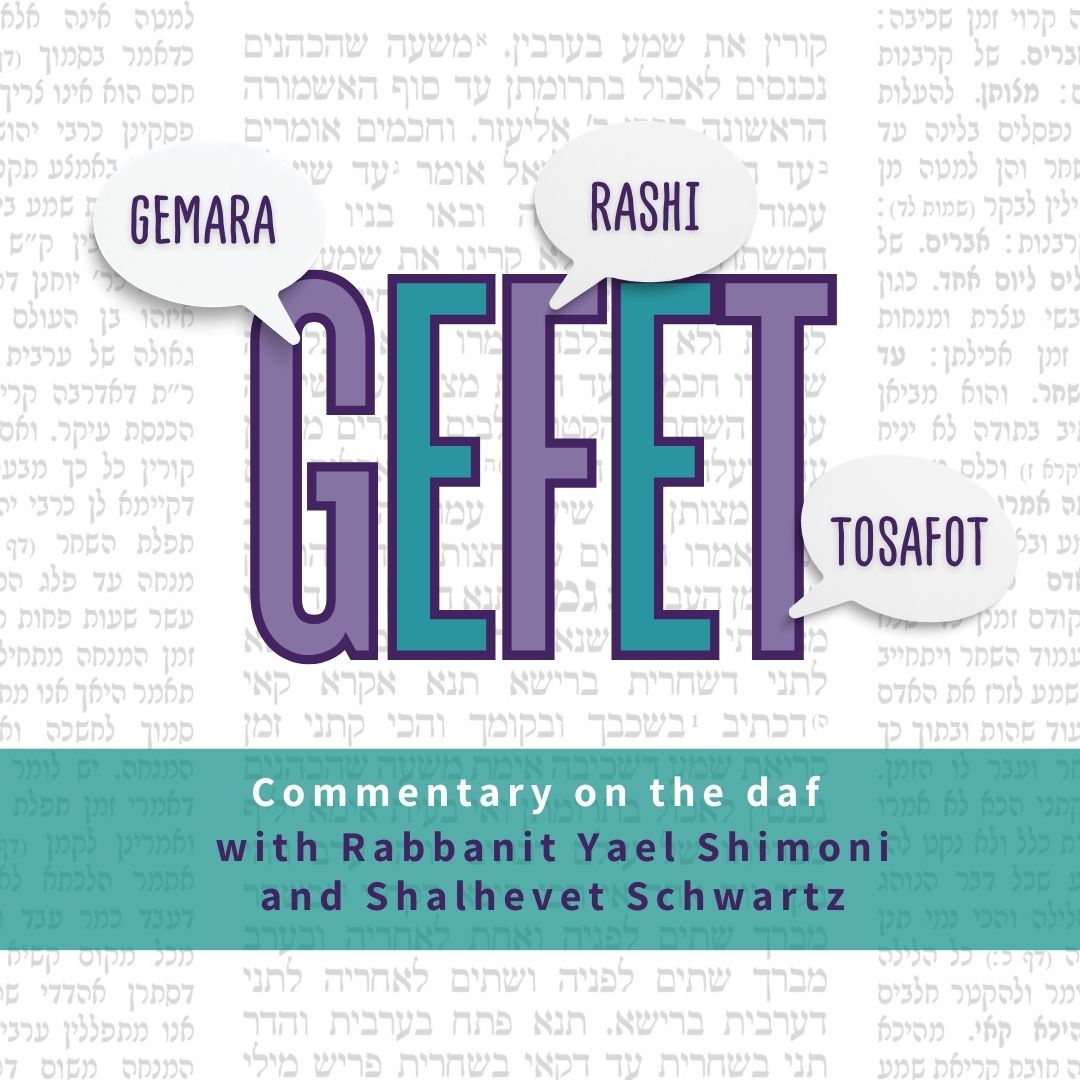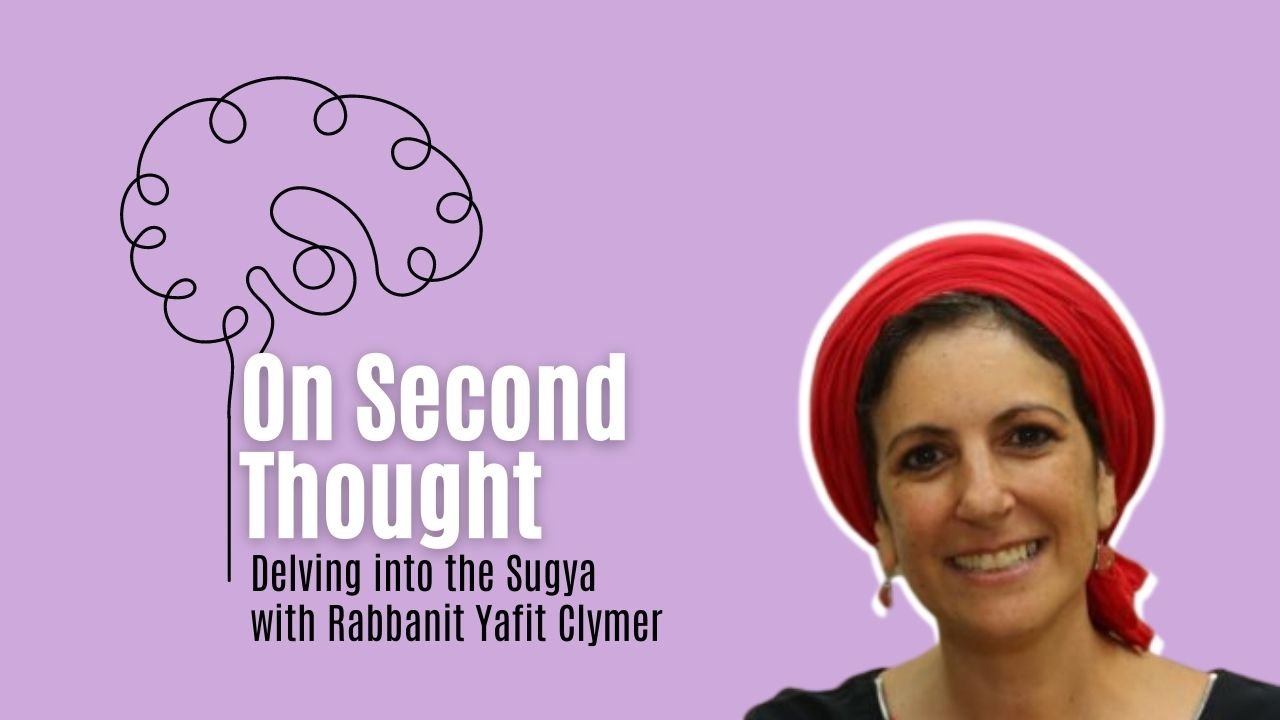The gemara deals with various cases in an attempt to discern what exactly causes one to be obligated separate sacrifices – is it different bodies, different names, different acts?
This week’s learning is sponsored for the merit and safety of Haymanut (Emuna) Kasau, who was 9 years old when she disappeared from her home in Tzfat two years ago, on the 16th of Adar, 5784 (February 25, 2024), and whose whereabouts remain unknown.
This week’s learning is dedicated of the safety of our nation, the soldiers and citizens of Israel, and for the liberation of the Iranian people. May we soon see the realization of “ליהודים היתה אורה ושמחה וששון ויקר”.
This week’s learning is sponsored for the merit and safety of Haymanut (Emuna) Kasau, who was 9 years old when she disappeared from her home in Tzfat two years ago, on the 16th of Adar, 5784 (February 25, 2024), and whose whereabouts remain unknown.
Want to dedicate learning? Get started here:


Today’s daily daf tools:
This week’s learning is sponsored for the merit and safety of Haymanut (Emuna) Kasau, who was 9 years old when she disappeared from her home in Tzfat two years ago, on the 16th of Adar, 5784 (February 25, 2024), and whose whereabouts remain unknown.
This week’s learning is dedicated of the safety of our nation, the soldiers and citizens of Israel, and for the liberation of the Iranian people. May we soon see the realization of “ליהודים היתה אורה ושמחה וששון ויקר”.
This week’s learning is sponsored for the merit and safety of Haymanut (Emuna) Kasau, who was 9 years old when she disappeared from her home in Tzfat two years ago, on the 16th of Adar, 5784 (February 25, 2024), and whose whereabouts remain unknown.
Today’s daily daf tools:
Delve Deeper
Broaden your understanding of the topics on this daf with classes and podcasts from top women Talmud scholars.
New to Talmud?
Check out our resources designed to help you navigate a page of Talmud – and study at the pace, level and style that fits you.
The Hadran Women’s Tapestry
Meet the diverse women learning Gemara at Hadran and hear their stories.
Keritot 15
שְׁחָטָהּ וְאֶת בַּת בִּתָּהּ, וְאַחַר כָּךְ שָׁחַט אֶת בִּתָּהּ – סוֹפֵג אֶת הָאַרְבָּעִים. סוֹמְכוֹס אוֹמֵר מִשּׁוּם רַבִּי מֵאִיר: סוֹפֵג שְׁמוֹנִים.
If one slaughtered an animal and its daughter’s daughter and afterward slaughtered the original animal’s daughter, he incurs the forty lashes for transgressing the prohibition against slaughtering an animal and its offspring on a single day (see Leviticus 22:28). Sumakhos says in the name of Rabbi Meir: He incurs eighty lashes for slaughtering the third animal, as its mother and its daughter had already been slaughtered on that day. This indicates that Sumakhos also maintains that when a person commits a single act and thereby commits two transgressions that are derived from a single verse, he is liable to receive punishment for both violations.
אָמַר רָבָא: דִּלְמָא לָא הִיא, עַד כָּאן לָא קָאָמַר רַבִּי יוֹחָנָן בֶּן נוּרִי הָכָא אֶלָּא מִשּׁוּם שֵׁמוֹת מוּחְלָקִין, דְּמִיקַּרְיָא חֲמוֹתוֹ, וּמִיקַּרְיָא אֵם חֲמוֹתוֹ, וּמִיקַּרְיָא אֵם חָמִיו.
Rava said: Perhaps it is not so, as Rabbi Yoḥanan ben Nuri would not agree with the ruling of Sumakhos. It is possible that Rabbi Yoḥanan ben Nuri says that one is liable to bring multiple sin offerings only here, in the case of one who engaged in intercourse with his mother-in-law, only due to the differentiated names of the prohibitions, as she is called his mother-in-law, and she is called his mother-in-law’s mother, and she is called his father-in-law’s mother, and the Torah prohibits each of these relationships separately.
אֲבָל גַּבֵּי אוֹתוֹ וְאֶת בְּנוֹ, דְּכוּלְּהוּ ״אוֹתוֹ וְאֶת בְּנוֹ״ מִיקַּרְיָין, דְּאֵין שֵׁמוֹת מוּחְלָקִין – לָא.
But with regard to the case of slaughtering a mother and its offspring in a single day, where all of the permutations are called: A mother and its offspring, as there are no differentiated names given in the Torah for slaughtering a mother animal and then its offspring or for slaughtering the offspring and subsequently its mother, Rabbi Yoḥanan ben Nuri might maintain that one is not liable to receive multiple sets of lashes.
אָמַר רַב נַחְמָן בַּר יִצְחָק: דִּלְמָא עַד כָּאן לָא קָאָמַר סוֹמְכוֹס אֶלָּא גַּבֵּי אוֹתוֹ וְאֶת בְּנוֹ, דְּגוּפִין מוּחְלָקִין.
By contrast, Rav Naḥman bar Yitzḥak said: Perhaps Sumakhos says that one is liable to receive two sets of lashes only with regard to the case of slaughtering a mother and its offspring on the same day, as there are differentiated bodies. Although he violated the same prohibition twice, he did so by slaughtering three different animals.
אֲבָל הָכָא, דְּאֵין גּוּפִין מוּחְלָקִין, אֵימָא כְּרַבִּי אֲבָהוּ אָמַר רַבִּי יוֹחָנָן סְבִירָא לֵיהּ, דְּאָמַר רַבִּי אֲבָהוּ אָמַר רַבִּי יוֹחָנָן: ״שַׁאֲרָה הֵנָּה זִמָּה הִיא״, הַכָּתוּב עֲשָׂאָן לְכוּלָּן זִמָּה אַחַת.
But here, with regard to a mother-in-law, where there are not several differentiated bodies, as the man engaged in intercourse with only one woman, one might say that Sumakhos holds in accordance with the statement that Rabbi Abbahu says in the name of Rabbi Yoḥanan, as Rabbi Abbahu says that Rabbi Yoḥanan says: The verse that introduces the prohibitions against engaging in intercourse with one’s mother-in-law, one’s mother-in-law’s mother, and one’s father-in-law’s mother concludes with the phrase: “They are near kinswomen; it is lewdness” (Leviticus 18:17). This teaches that although these are different relationships, the verse rendered them all one single prohibition of lewdness, for which only a single sin offering is brought.
מַתְנִי׳ אָמַר רַבִּי עֲקִיבָא: שָׁאַלְתִּי אֶת רַבָּן גַּמְלִיאֵל וְאֶת רַבִּי יְהוֹשֻׁעַ בָּאִיטְלֵיס שֶׁל עֵימָאוּם, שֶׁהָלְכוּ לִיקַּח בְּהֵמָה לְמִשְׁתֵּה בְנוֹ שֶׁל רַבָּן גַּמְלִיאֵל, הַבָּא עַל אֲחוֹתוֹ וְעַל אֲחוֹת אָבִיו וְעַל אֲחוֹת אִמּוֹ, מַהוּ? חַיָּיב אַחַת עַל כּוּלָּן, אוֹ חַיָּיב עַל כָּל אַחַת וְאֶחָת?
MISHNA: Rabbi Akiva said: I asked Rabban Gamliel and Rabbi Yehoshua in the meat market [itlis] in Emmaus, where they went to purchase an animal for the wedding feast of the son of Rabban Gamliel: In the case of one who unwittingly engages in intercourse with his sister, and the sister of his father, and the sister of his mother, during one lapse of awareness, what is the halakha? Is he liable to bring one sin offering for all three prohibitions, or is he liable to bring a separate sin offering for each and every one of the prohibitions?
לוֹ: לֹא שָׁמַעְנוּ, אֲבָל שָׁמַעְנוּ: הַבָּא עַל חָמֵשׁ נָשָׁיו נִדּוֹת בְּהֶעְלֵם (אַחַת) [אֶחָד], שֶׁהוּא חַיָּיב עַל כׇּל אַחַת וְאֶחָת, (וְרוֹאֶה אֲנִי) [וְרוֹאִין אָנוּ] שֶׁהַדְּבָרִים קַל וָחֹמֶר.
They said to Rabbi Akiva: We did not hear a ruling from our teachers about that case, but we heard the following ruling: One who engages in intercourse with each of his five wives while they are menstruating, during one lapse of awareness, we heard that he is liable to bring a separate sin offering for having engaged in intercourse with each and every one of them. And it appears to me that these matters can be derived from an a fortiori inference: If he is liable to bring separate sin offerings for having engaged in intercourse with five menstruating women, who are forbidden by one prohibition, he should certainly be liable to bring separate sin offerings for having engaged in intercourse with his sister, the sister of his father, and the sister of his mother, who are forbidden by three separate prohibitions.
גְּמָ׳ הֵיכִי דָמֵי? אִילֵּימָא כִּדְקָתָנֵי, מַאי תִּיבְּעֵי לֵיהּ? הֲרֵי שֵׁמוֹת מוּחְלָקִין, הֲרֵי גּוּפִין מוּחְלָקִין!
GEMARA: The Gemara raises a difficulty with regard to Rabbi Akiva’s question: What are the circumstances about which Rabbi Akiva inquired? If we say that the circumstances are precisely as the mishna teaches them, that one unwittingly engaged in intercourse with his sister, and the sister of his father, and the sister of his mother, then for what purpose did Rabbi Akiva raise this dilemma before Rabban Gamliel and Rabbi Yehoshua? Aren’t they differentiated names of prohibitions and aren’t they also differentiated bodies? Since the man engaged in intercourse with three women, who are forbidden by three distinct prohibitions, it is obvious that he is obligated to bring three separate sin offerings.
אֶלָּא הָכִי קָתָנֵי: הַבָּא עַל אֲחוֹת אָבִיו שֶׁהִיא אֲחוֹת אִמּוֹ, חַיָּיב אַחַת עַל כּוּלָּן, אוֹ חַיָּיב עַל כׇּל אַחַת וְאֶחָת, מַהוּ? מִי אָמְרִינַן: הֲרֵי שֵׁמוֹת מוּחְלָקִין, אוֹ דִלְמָא הֲרֵי אֵין גּוּפִין מוּחְלָקִין?
Rather, it must be that this is what the mishna is teaching: Rabbi Akiva asked: In the case of one who unwittingly engages in intercourse with his sister who is also the sister of his father and who is also the sister of his mother, is he liable to bring only one sin offering for violating all of those prohibitions, or is he liable to bring a separate sin offering for each and every one? What is the halakha? Do we say that they are differentiated names of prohibitions, and since he violated distinct prohibitions, he is liable to bring separate sin offerings? Or perhaps we say: It is not a case of differentiated bodies; since he engaged in intercourse with only one woman, he is liable to bring only a single sin offering.
אָמְרוּ לוֹ: לֹא שָׁמַעְנוּ, אֲבָל שָׁמַעְנוּ: הַבָּא עַל חָמֵשׁ נָשָׁיו נִדּוֹת בְּבַת אַחַת, שֶׁהוּא שֵׁם אֶחָד, שֶׁחַיָּיב עַל כׇּל אַחַת וְאַחַת מִשּׁוּם נִדָּה,
And in response, they said to him: We did not hear a ruling from our teachers about that case, but we heard the following ruling: With regard to one who engages in intercourse with each of his five wives while they are menstruating, at the same time, i.e., during one lapse of awareness, which is five instances of violating one category of prohibition, we heard that he is liable to bring a separate sin offering for having engaged in intercourse with each and every one of them, due to the prohibition against engaging in intercourse with a menstruating woman.
וְרָאִינוּ שֶׁהַדְּבָרִים קַל וָחוֹמֶר: וּמָה הַבָּא עַל חָמֵשׁ נָשָׁיו נִדּוֹת בְּבַת אַחַת, שֶׁהִיא שֵׁם אַחַת – חַיָּיב עַל כׇּל אַחַת וְאַחַת, אֲחוֹתוֹ שֶׁהִיא אֲחוֹת אָבִיו שֶׁהִיא אֲחוֹת אִמּוֹ, שֶׁהֵן שְׁלֹשָׁה שֵׁמוֹת – אֵינוֹ דִּין שֶׁיְּהֵא חַיָּיב עַל כׇּל אַחַת וְאַחַת?
And it appears to us that these matters can be derived from an a fortiori inference: If one who engages in intercourse with his five wives while they are menstruating, at the same time, which is only one name of a prohibition, is nevertheless liable to bring a sin offering for each and every one of them, then in the case of one who engages in intercourse with his sister who is also the sister of his father and the sister of his mother, which are three separate prohibition names, is it not logical that he should be liable for each and every one of them?
אִיכָּא לְמִיפְרַךְ: מָה לְחָמֵשׁ נִדּוֹת – שֶׁכֵּן גּוּפִין מוּחְלָקִין!
The Gemara raises an objection: This line of reasoning can be refuted, as follows: What is notable about the case of five menstruating women that would render one liable to bring a separate sin offering for having intercourse with each one of them? It is notable in that they are differentiated bodies, which is not the case with regard to one’s sister who is also the sister of his father and the sister of his mother, as she is a single person.
אֶלָּא אָמַר קְרָא: ״עֶרְוַת אֲחוֹתוֹ גִלָּה״, לְחַיֵּיב עַל אֲחוֹתוֹ שֶׁהִיא אֲחוֹת אָבִיו שֶׁהִיא אֲחוֹת אִמּוֹ.
Rather, the reason one is liable to bring three separate sin offerings for engaging in intercourse with his sister who is also the sister of his mother and the sister of his father is that the verse states: “And if a man takes his sister…and they shall be cut off [venikhretu] in the sight of the children of their people; he has uncovered his sister’s nakedness” (Leviticus 20:17). The final clause in this verse serves to render him liable to receive three separate penalties of karet for intentional intercourse, or to bring three separate sin offerings for unwitting intercourse, with his sister who is also the sister of his father and who is the sister of his mother.
אָמַר רַב אַדָּא בַּר אַהֲבָה: מַשְׁכַּחַתְּ לַהּ בְּרַשִּׁיעָא בַּר רַשִּׁיעָא, שֶׁבָּא עַל אִמּוֹ וְהוֹלִיד שְׁתֵּי בָּנוֹת, וְחָזַר וּבָא עַל אַחַת מֵהֶן וְהוֹלִיד בֵּן, וּבָא בְּנוֹ עַל אֲחוֹת אִמּוֹ, שֶׁהִיא אֲחוֹתוֹ, שֶׁהִיא אֲחוֹת אָבִיו, דְּהָוֵה לֵיהּ רַשִּׁיעָא בַּר רַשִּׁיעָא.
The Gemara explains how there could be a case where one’s sister is also the sister of his father and the sister of his mother: Rav Adda bar Ahava says: You find it in the case of a wicked man, the son of a wicked man. The case applies if a man engaged in intercourse with his mother and fathered two daughters, and then engaged in intercourse with one of those daughters and fathered a son, and his son engaged in intercourse with his mother’s sister who is also his own sister, because they share a father, and who is also his father’s sister. This individual is a wicked man, the son of a wicked man, as both he and his father engaged in incestuous relationships.
תָּנוּ רַבָּנַן: בָּא עָלֶיהָ, וְחָזַר וּבָא עָלֶיהָ, וְחָזַר וּבָא עָלֶיהָ – חַיָּיב עַל כׇּל אַחַת וְאֶחָת, דִּבְרֵי רַבִּי אֱלִיעֶזֶר. וַחֲכָמִים אוֹמְרִים: אֵינוֹ חַיָּיב אֶלָּא אֶחָת.
§ The Sages taught in a baraita: If one unwittingly engages in intercourse with a woman who is forbidden to him under the penalty of excision from the World-to-Come [karet], and then again engages in intercourse with her, and then yet again engages in intercourse with her, all during one lapse of awareness, he is liable to bring a separate sin offering for each and every one of the acts of intercourse with her. This is the statement of Rabbi Eliezer. But the Rabbis say: He is liable to bring only one sin offering.
וּמוֹדִים חֲכָמִים לְרַבִּי אֱלִיעֶזֶר בְּבָא עַל חָמֵשׁ נָשָׁיו נִדּוֹת בְּבַת אַחַת, שֶׁהוּא חַיָּיב עַל כׇּל אַחַת וְאַחַת, הוֹאִיל וְהוּא גָּרַם לָהֶן.
And the Rabbis concede to Rabbi Eliezer with regard to one who engages in intercourse with his five wives while they are menstruating, where the prohibition was violated unwittingly by both the man and the woman, at the same time, i.e., during one lapse of awareness, that he is liable for each and every one of them, since he caused each of them to be liable to bring a sin offering.
אָמַר רָבָא לְרַב נַחְמָן: מִי אָמְרִינַן ״הוֹאִיל וְהוּא גָּרַם לָהֶן״? וְהָתַנְיָא: הוּא בְּהֶעְלֵם (אַחַת) [אֶחָד] וְהִיא בַּחֲמִשָּׁה הֶעְלֵמוֹת – הוּא אֵינוֹ חַיָּיב אֶלָּא אַחַת וְהִיא חַיֶּיבֶת עַל כׇּל אַחַת וְאֶחָת.
Rava said to Rav Naḥman: Do we really say that since he caused each of them to be liable to bring a sin offering, he himself is liable to bring five separate sin offerings? But isn’t it taught in a baraita: If one unwittingly engages in intercourse five times with a woman who is forbidden to him, and he does so during one lapse of awareness, without realizing over the course of that time period that the act is forbidden, but she does so during five lapses of awareness, as she repeatedly became aware of the prohibition and then forgot it before the next transgression, he is liable to bring only one sin offering, but she is liable to bring a separate sin offering for each and every one of the five transgressions? In this case, although he caused her to bring several sin offerings, he himself brings only one sin offering.
אֶלָּא אֵימָא: הוֹאִיל וְגוּפִין מוּחְלָקִין.
Rather, one must say that this is the reason he brings five sin offerings for engaging in intercourse with his five wives while they were each menstruating, during one lapse of awareness: It is because they are differentiated bodies.
אִיבַּעְיָא לְהוּ, קָצַר וְקָצַר – מָה לִי אָמַר רַבִּי אֱלִיעֶזֶר?
The Gemara discusses the opinion of Rabbi Eliezer that one who repeatedly engages in intercourse with a woman who is forbidden to him is liable to bring a separate sin offering for each act of intercourse, even if this all occurred in a single lapse of awareness. A dilemma was raised before the Sages: If one reaped a fig-bulk of grain on Shabbat, which is the measure for which one is liable to bring a sin offering, and then reaped another fig-bulk, in a single lapse of awareness, what would Rabbi Eliezer say?
טַעְמָא דְּרַבִּי אֱלִיעֶזֶר הָתָם מִשּׁוּם דְּהוּא דַּעֲבַד תַּרְתֵּין, וְאַמְּטוּל (ל)הָכִי אָמַר: חַיָּיב עַל כׇּל אַחַת וְאַחַת, וְהָכָא נָמֵי דַּעֲבַד תַּרְתֵּין,
The Gemara explains the sides of the dilemma: Is the reason for the ruling of Rabbi Eliezer there, with regard to forbidden relations, that the sinner performed two separate prohibited acts, and therefore Rabbi Eliezer says he is liable to bring a separate sin offering for each and every one of the acts? If so, here too, where he performed two separate acts of reaping, he is liable to bring a separate sin offering for each act.
אוֹ דִּלְמָא טַעְמֵיהּ דְּרַבִּי אֱלִיעֶזֶר הָתָם מִשּׁוּם דְּאִי אֶפְשָׁר לוֹ לְעָרְבָן לְבִיאוֹת זוֹ בָּזוֹ, אַמְּטוּל (לְ)הָכִי אָמַר רַבִּי אֱלִיעֶזֶר: חַיָּיב עַל כׇּל אַחַת וְאַחַת, אֲבָל קָצַר כִּגְרוֹגֶרֶת וְחָזַר וְקָצַר כִּגְרוֹגֶרֶת בְּהֶעְלֵם (אַחַת) [אֶחָד], כֵּיוָן דְּאֶפְשָׁר לוֹ לְעָרֵב שְׁתֵּי גְּרוֹגְרוֹת בְּבַת אַחַת אֵינוֹ חַיָּיב אֶלָּא אֶחָת, מַאי?
Or, perhaps the reason for the ruling of Rabbi Eliezer there, in the case of forbidden relations, is that it is impossible for the sinner to combine the acts of intercourse with one another, and therefore Rabbi Eliezer says that he is liable to bring a separate sin offering for each and every one of the acts of intercourse. But if one reaped a fig-bulk of grain, and then reaped another fig-bulk, in a single lapse of awareness, since it is possible for him to combine the two fig-bulks of grain together and reap them at the same time, he would be liable to bring only one sin offering. What is the correct explanation for Rabbi Eliezer’s ruling?
אָמַר רַבָּה: טַעְמָא דְּרַבִּי אֱלִיעֶזֶר הָתָם – מִשּׁוּם דַּעֲבַד תַּרְתֵּי, הָכָא נָמֵי הָא עֲבַד תַּרְתֵּי. וְרַב יוֹסֵף אָמַר: טַעְמָא דְּרַבִּי אֱלִיעֶזֶר הָתָם – דְּאִי אֶפְשָׁר לוֹ לְעָרְבָן, אֲבָל אֶפְשָׁר לוֹ לְעָרְבָן – אֵינוֹ חַיָּיב אֶלָּא אֶחָת.
Rabba said: The reason for the ruling of Rabbi Eliezer there, in the case of forbidden relations, is that the sinner performed two separate prohibited acts; and here too, he has performed two separate acts of reaping and is liable to bring two sin offerings. And Rav Yosef said: The reason for the ruling of Rabbi Eliezer there, in the case of forbidden relations, is that it is impossible for him to combine the two transgressions into a single act; but if it is possible for him to combine them, e.g., by reaping two fig-bulks of grain, he is liable to bring only one sin offering.
אֵיתִיבֵיהּ אַבָּיֵי לְרַבָּה: רַבִּי אֱלִיעֶזֶר מְחַיֵּיב עַל וַלְדֵי מְלָאכוֹת בִּמְקוֹם אֲבוֹת מְלָאכוֹת.
Abaye raised an objection to the opinion of Rabba from a baraita: Each type of labor prohibited on Shabbat comprises acts that are primary categories of that labor and acts that are subcategories of that labor, both prohibited by Torah law. Rabbi Eliezer deems one liable to bring separate sin offerings for the performance of subcategories of prohibited labor on Shabbat in a situation where he also performed the corresponding primary categories of prohibited labor during the same lapse of awareness. For example, if one planted grain on Shabbat and then watered the field, which is a subcategory of the prohibited labor of planting, he is liable to bring two sin offerings.
הָא אָב וְאָב, בְּבַת אַחַת – פָּטוּר. וְאִי אָמְרַתְּ טַעְמָא דְּרַבִּי אֱלִיעֶזֶר מִשּׁוּם דְּקָעָבֵד תַּרְתֵּי, אַמַּאי פָּטוּר?
It may be inferred from this statement that: But if one performed a primary category of labor and then performed the same primary category at the same time, i.e., during the same lapse of awareness, he is exempt from bringing a second sin offering. But if you say that the reason for the ruling of Rabbi Eliezer in the case of one who engages in repeated acts of intercourse with a woman forbidden to him is because the sinner performed two separate prohibited acts, then why is one exempt from bringing a second sin offering for repeatedly performing a primary category of prohibited labor on Shabbat, when he too has performed distinct prohibited acts?
אָמַר מָר בְּרֵיהּ דְּרַבָּנַן: אֲנָא וְרַב נְחוּמִי בַּר זְכַרְיָה תַּרְגֵּימְנָא: הָכָא בְמַאי עָסְקִינַן –
Mar, son of the Sages, said: Rav Naḥumi bar Zekharya and I interpreted the baraita as follows: What are we dealing with here, in the case where one is liable to bring two sin offerings for performing a primary category of prohibited labor and its subcategory?
בְּדָלִית הַמּוּדְלֵית עַל גַּבֵּי תְּאֵינָה וּקְצָצָן בְּבַת אַחַת, מִשּׁוּם הָכִי מְחַיֵּיב רַבִּי אֱלִיעֶזֶר, הוֹאִיל וְשֵׁמוֹת מוּחְלָקִין וְגוּפִין מוּחְלָקִין.
It is a case of a climbing grapevine that is trellised over a fig tree, and he cut them both, the grapevine and the figs, at the same time, during one lapse of awareness. Detaching the figs is one of the primary categories of the prohibited labor of harvesting, while pruning the vine in order to use it as fuel for a fire is a subcategory of harvesting. Due to that reason Rabbi Eliezer deems him liable to bring two sin offerings, since it is a case of differentiated names of prohibitions, as he violated both the primary category of the labor and a subcategory, and it is also a case of differentiated physical entities, as he detached figs and part of a grapevine.
דִּכְווֹתַהּ קָצַר וְקָצַר, הֵיכִי מַשְׁכַּחַתְּ לַהּ דְּמִיפְּטַר? כְּגוֹן שֶׁקָּצַר שְׁתֵּי גְּרוֹגְרוֹת בְּבַת אַחַת, אֲבָל קָצַר כִּגְרוֹגֶרֶת וְחָזַר וְקָצַר כִּגְרוֹגֶרֶת – חַיָּיב.
In the corresponding situation, where one reaped a fig-bulk of grain on Shabbat and then reaped another fig-bulk in a single lapse of awareness, how can you find circumstances in which he is exempt from bringing a second sin offering? You find this in a situation where he reaped two fig-bulks simultaneously, in which case he performed only a single prohibited act. But if one reaped a fig-bulk of grain and then reaped another fig-bulk, he is liable to bring two sin offerings, as he performed two separate acts.
מַתְנִי׳ וְעוֹד שָׁאַל רַבִּי עֲקִיבָא: אֵבֶר הַמְדֻולְדָּל בַּבְּהֵמָה, מַהוּ? אָמְרוּ לוֹ: לֹא שָׁמַעְנוּ, אֲבָל שָׁמַעְנוּ אֵבֶר הַמְדֻולְדָּל בָּאָדָם שֶׁהוּא טָהוֹר, וְכָךְ הָיוּ
MISHNA: And furthermore, Rabbi Akiva asked Rabban Gamliel and Rabbi Yehoshua in the meat market of Emmaus: What is the status of a dangling limb of an animal? Does it impart ritual impurity like a severed limb? They said to Rabbi Akiva: We have not heard a ruling from our teachers in that specific case, but we have heard with regard to a dangling limb of a person that it is ritually pure. And in this manner would
מוּכֵּי שְׁחִין עוֹשִׂין בִּירוּשָׁלַיִם, הוֹלֵךְ לוֹ עֶרֶב פֶּסַח אֵצֶל הָרוֹפֵא, וְחוֹתְכוֹ עַד שֶׁמַּנִּיחַ בּוֹ כְּשַׂעֲרָה, וְתוֹחֲבוֹ בְּסִירָא, וְנִמְשָׁךְ מִמֶּנּוּ,
the people afflicted with boils, whose limbs were dangling due to their affliction, act in Jerusalem: Each of them would go on Passover eve to the doctor, who would cut the affected limb almost completely until he would leave it connected by a hairbreadth of flesh, so that neither the doctor nor the afflicted would be rendered ritually impure by a severed limb. Then, the doctor would impale the limb on a thorn attached to the floor or the wall, and the afflicted would pull away from the thorn, thereby completely severing the limb.
וְהַלָּה, עוֹשֶׂה פִּסְחוֹ וְהָרוֹפֵא עוֹשֶׂה פִּסְחוֹ, וְרוֹאֶה אֲנִי שֶׁהַדְּבָרִים קַל וָחוֹמֶר.
And that person afflicted with boils would perform the rite of his Paschal offering, and the doctor would perform the rite of his Paschal offering, as neither had come into contact with the limb once it was severed. In any case, as long as it was dangling, the limb did not impart impurity. And I consider that these matters can be derived from an a fortiori inference. If a person’s limb, the impurity of which when amputated is severe, does not impart impurity when it is dangling, it is all the more so logical that an animal’s limb, the impurity of which when amputated is lenient, does not impart impurity when it is dangling.
גְּמָ׳ תְּנַן הָתָם: הַמּוֹחֵק אֶת הַכְּרֵישָׁה, וְהַסּוֹחֵט בִּשְׂעָרוֹ וּבִכְסוּתוֹ – מַשְׁקִין שֶׁבְּתוֹכוֹ אֵינָם בְּ״כִי יוּתַּן״, וְהַיּוֹצְאִין מִמֶּנּוּ הֲרֵי הֵן בְּ״כִי יוּתַּן״.
GEMARA: We learned in a mishna elsewhere (Makhshirin 1:5): With regard to one who forcefully wipes rainwater from the surface of a leek or squeezes out water absorbed in his hair or in his clothing, the liquid that remains within it is not included under the rubric of the verse: “If water be put upon the seed, and some of their carcass fall on it, it is impure for you” (Leviticus 11:38). Therefore, it cannot render food susceptible to contracting ritual impurity. But the liquid that is released from it, in this process of wiping or squeezing, is included under the rubric of the verse: “If water be put,” and therefore it renders any food it touches susceptible to ritual impurity, as the person has accorded it significance.
אָמַר שְׁמוּאֵל: וּכְרֵישָׁה עַצְמָהּ הוּכְשְׁרָה, מַאי טַעְמָא? בִּשְׁעַת פְּרִישָׁה מִמֶּנּוּ הוּכְשְׁרָה.
Shmuel says: And the leek itself is rendered susceptible to ritual impurity. What is the reason for this? The reason is that at the moment of the water’s separation from the leek, the leek is rendered susceptible to ritual impurity by the very water which is released from it.
וְהָתְנַן: עֶרֶב פֶּסַח הוֹלֵךְ לוֹ אֵצֶל כּוּ׳. וְאִי אָמְרַתְּ בִּשְׁעַת פְּרִישָׁתָן הוּכְשַׁר, הָא אִיכָּא נָמֵי הָהוּא אֵבֶר הַמְדוּלְדָּל, בִּשְׁעַת פְּרִישָׁתוֹ מֵאָדָם – נְטַמְּיֵיהּ לְאָדָם!
The Gemara raises an objection: But we learned in the mishna: A person afflicted with boils would go on Passover eve to the doctor to sever his dangling limb, and the doctor and the afflicted individual would remain pure. And if you say that at the moment of the water’s separation from the leek, the leek is rendered susceptible to ritual impurity, there is also a parallel situation in that case of the dangling limb; at the moment of its separation from the person with boils it should render that person ritually impure.
כִּדְקָאָמַר רַב יוֹסֵף: בְּנִיתָּזִין בְּכׇל כֹּחָן, הָכָא נָמֵי, בְּנִיתָּזִין בְּכׇל כֹּחָן.
The Gemara answers: The explanation is as Rav Yosef says in a different context, that it is referring to a situation where the liquids are removed with great force. Here too, in the case of the dangling limb, it can be explained as referring to a situation where the limbs are removed with great force. Since the limb is pulled off in one powerful motion it is not considered to have touched the person after it was detached. By contrast, the water wiped off the leek is not discharged all at once, and therefore as the drops of water separate from the leek they render it susceptible to ritual impurity.
וְהֵיכָא אִיתְּמַר דְּרַב יוֹסֵף? אַהָא: זָב וּטְמֵא מֵת שֶׁהָיוּ מְהַלְּכִים וְיָרְדוּ עֲלֵיהֶם גְּשָׁמִים, אַף עַל פִּי שֶׁסּוֹחֲטִין זֶה אֶת זֶה, מַשְׁקִין הַיּוֹרְדִין מִצַּד הָעֶלְיוֹן לְצַד הַתַּחְתּוֹן – טְהוֹרִים, שֶׁאֵין מְחַשְּׁבִין אֶלָּא שֶׁיָּצְאוּ מִכּוּלָּן.
And where, i.e., in connection to which case, was this explanation of Rav Yosef stated? It was stated with regard to this baraita: If a man who experiences a gonorrhea-like discharge [zav] and one who is ritually impure through contact with a corpse were walking along and rain fell on them, although they squeeze the garments of one another in order to remove the water, those liquids that flow down from the upper section of a garment to the lower section remain pure. They do not become impure from contact with the impure person or his garments, as these liquids are not considered liquids that can become ritually impure unless they have emerged from those garments entirely.
יָצְאוּ מִכּוּלָּן – הֲרֵי מַכְשִׁירִין, שֶׁאֵין נֶחְשָׁבִין אֶלָּא לְאַחַר שֶׁיָּצְאוּ מִגּוּפוֹ. אָמַר רַב יוֹסֵף: בְּנִיתָּזִין בְּכׇל כֹּחָן.
Once the liquids have emerged from those garments entirely they render food susceptible to ritual impurity, as the people have accorded it significance by squeezing it out of their garments. But the water itself is still not impure, as it is considered liquid that is susceptible to ritual impurity only after it has completely emerged from the body of those garments. Rav Yosef said: The reason the water does not become impure when it separates from the garment is that the baraita is referring to a case where it is removed with great force.
מַתְנִי׳ וְעוֹד (שָׁאֲלוּ) [שְׁאֵלָן] רַבִּי עֲקִיבָא: הַשּׁוֹחֵט חֲמִשָּׁה זְבָחִים בַּחוּץ בְּהֶעְלֵם (אַחַת) [אֶחָד] מַהוּ? חַיָּיב עַל כׇּל אַחַת וְאַחַת, אוֹ אַחַת עַל כּוּלָּן? אָמְרוּ לוֹ: לֹא שָׁמַעְנוּ.
MISHNA: And furthermore, Rabbi Akiva asked Rabban Gamliel and Rabbi Yehoshua: With regard to one who unwittingly slaughters five offerings outside the Temple during one lapse of awareness, what is the halakha? Is he liable to bring five sin offerings, one for each and every act of slaughter, or is he liable to bring one sin offering for all the acts of slaughter? They said to Rabbi Akiva: We have not heard a ruling from our teachers in that specific case.
אָמַר רַבִּי יְהוֹשֻׁעַ: שָׁמַעְתִּי בְּאוֹכֵל מִזֶּבַח אֶחָד מֵחֲמִשָּׁה תַּמְחוּיִין בְּהֶעְלֵם אַחַת שֶׁהוּא חַיָּיב עַל כׇּל אַחַת וְאַחַת מִשּׁוּם מְעִילָה, וְרוֹאֶה אֲנִי שֶׁהַדְּבָרִים קַל וָחוֹמֶר.
Rabbi Yehoshua said: I have heard with regard to one who eats meat from one offering from five different pots in which they were prepared, during one lapse of awareness, that he is liable to bring five guilt offerings, which are for the meat prepared in each and every pot, due to misuse of consecrated property. And I consider that these matters can be derived from an a fortiori inference: If one is liable to bring five guilt offerings for one offering prepared in five pots, all the more so is he liable to bring five sin offerings for slaughtering five offerings outside the Temple.
אָמַר רַבִּי שִׁמְעוֹן: לֹא כָּךְ שָׁאַל(ו) רַבִּי עֲקִיבָא, אֶלָּא בְּאוֹכֵל נוֹתָר מֵחֲמִשָּׁה זְבָחִים בְּהֶעְלֵם (אַחַת) [אֶחָד] מַהוּ? חַיָּיב אַחַת עַל כּוּלָּן, אוֹ חַיָּיב עַל כׇּל אַחַת וְאֶחָת? אָמְרוּ לוֹ: לֹא שָׁמַעְנוּ.
Rabbi Shimon said: It was not that question that Rabbi Akiva asked them. Rather, it was with regard to one who eats notar from five offerings during one lapse of awareness. What is the halakha? Is he liable to bring one sin offering for all the offerings from which he ate notar, or is he liable to bring five sin offerings, one for each and every one of the offerings from which he ate notar? They said to Rabbi Akiva: We have not heard a ruling from our teachers in that specific case.
אָמַר רַבִּי יְהוֹשֻׁעַ: שָׁמַעְתִּי בְּאוֹכֵל מִזֶּבַח אֶחָד בַּחֲמִשָּׁה תַּמְחוּיִין בְּהֶעְלֵם (אַחַת) [אֶחָד] שֶׁהוּא חַיָּיב עַל כׇּל אַחַת וְאַחַת מִשּׁוּם מְעִילָה, וְרוֹאֶה אֲנִי שֶׁהַדְּבָרִים קַל וָחוֹמֶר.
Rabbi Yehoshua said: I have heard with regard to one who eats meat from one offering that was prepared in five different pots, during one lapse of awareness, that he is liable to bring separate guilt offerings for the meat prepared in each and every pot, due to misuse of consecrated property. And I consider that these matters can be derived from an a fortiori inference: If one is liable to bring five guilt offerings for one offering prepared in five pots, all the more so is he liable to bring five sin offerings for eating the notar of five separate offerings.
אָמַר לוֹ רַבִּי עֲקִיבָא: אִם הֲלָכָה – נְקַבֵּל, אִם לָדִין – יֵשׁ תְּשׁוּבָה. אָמַר לוֹ: הָשֵׁב.
Rabbi Akiva said to Rabbi Yehoshua: If you are reporting a halakha that you received from your teachers with regard to one who eats notar from five offerings, we will accept it, but if it is based merely on the a fortiori inference from misuse of consecrated property, there is a response that refutes the inference. Rabbi Yehoshua said to Rabbi Akiva: Respond.
אָמַר: וְלֹא אִם אָמַרְתָּ בִּמְעִילָה, שֶׁעָשָׂה בָּהּ אֶת הַמַּאֲכִיל כָּאוֹכֵל וְאֶת הַמְהַנֶּה כַּנֶּהֱנֶה,
Rabbi Akiva said: And no; one cannot derive the halakha of notar through an a fortiori inference from misuse of consecrated property: If you said with regard to misuse of consecrated property that one is liable to bring five guilt offerings, perhaps that is because there are additional stringent elements unique to misuse. As, with regard to misuse, the Torah established that the status of one who feeds another person sacrificial meat is like that of one who eats sacrificial meat, and the status of one who gives benefit to another from consecrated property that is not food is like that of one who derives benefit himself, in that each is liable to bring a guilt offering for misuse.
צֵירֵף אֶת הַמְּעִילָה לִזְמַן מְרוּבֶּה, תֹּאמַר בְּנוֹתָר, שֶׁאֵין בּוֹ אַחַת מֵאֵלּוּ.
In addition, the Torah joined the misuse of consecrated property that was performed over an extended period, i.e., if one derived benefit worth half a peruta one day and half a peruta the next, he is liable to bring a guilt offering for misuse. Would you say the same with regard to notar, which has none of these halakhot?
גְּמָ׳ מַאי קַשְׁיָא לֵיהּ לְרַבִּי שִׁמְעוֹן? הָכִי קָא קַשְׁיָא לֵיהּ: מָה רְאָיָה לְשׁוֹחֵט מֵאוֹכֵל? מָה לְאוֹכֵל שֶׁכֵּן נֶהֱנֶה!
GEMARA: The Gemara asks: What is difficult for Rabbi Shimon with the first version of Rabbi Akiva’s question, that he insists that Rabbi Akiva had asked about one who eats notar from five offerings? The Gemara answers that this is what is difficult for him: If Rabbi Akiva asked about one who unwittingly sins by slaughtering, why is the answer derived from an unwitting sin involving eating? After all, what proof can be cited for a case of one who slaughters from a case of one who eats? What is notable about one who eats? It is notable in that he derives benefit from the act of eating, whereas one who slaughters does not derive physical benefit.
אֶלָּא כָּךְ (שָׁאֲלוּ) [שְׁאֵלָן]: הָאוֹכֵל נוֹתָר מֵחֲמִשָּׁה זְבָחִים בְּהֶעְלֵם (אַחַת) [אֶחָד], מַהוּ? חַיָּיב בְּכׇל אַחַת וְאַחַת, אוֹ אַחַת עַל כּוּלָּן? אָמְרוּ לוֹ: לֹא שָׁמַעְנוּ.
Rather, he must have asked him this: In the case of one who eats notar from five offerings during one lapse of awareness, what is the halakha? Is he liable to bring a separate sin offering for each and every one of the offerings, or only one sin offering for all of them? They said to Rabbi Akiva: We have not heard a ruling from our teachers in that specific case.
אָמַר רַבִּי יְהוֹשֻׁעַ: שָׁמַעְתִּי בְּאוֹכֵל מִזֶּבַח אֶחָד מֵחֲמִשָּׁה תַּמְחוּיִין בְּהֶעְלֵם (אַחַת) [אֶחָד] שֶׁחַיָּיב עַל כׇּל אַחַת וְאַחַת מִשּׁוּם מְעִילָה, וְרוֹאֶה אֲנִי שֶׁהַדְּבָרִים קַל וָחוֹמֶר – מָה מִזֶּבַח אֶחָד שֶׁאֵין גּוּפִין מוּחְלָקִין חַיָּיב עַל כׇּל אַחַת וְאַחַת מִשּׁוּם תַּמְחוּיִין מוּחְלָקִין, חֲמִשָּׁה זְבָחִים דְּגוּפִין מוּחְלָקִין לֹא כׇּל שֶׁכֵּן?
Rabbi Yehoshua said: I have heard with regard to one who eats meat from one offering from five different pots, during one lapse of awareness, that he is liable to bring a separate guilt offering for the meat prepared in each and every pot, due to misuse of consecrated property. And I consider that these matters may be derived from an a fortiori inference: Just as one who eats from one offering prepared in five pots, in which case the different parts of the offering do not come from differentiated physical entities, is liable to bring a separate guilt offering for the food prepared in each and every pot because he ate from differentiated pots, with regard to one who eats notar from five separate offerings, which are differentiated physical entities, is it not all the more so logical that he is liable to bring a separate sin offering for each and every offering?
אָמַר רַבִּי שִׁמְעוֹן: לֹא כָּךְ שָׁאַל(ו), אֶלָּא בְּאוֹכֵל (מזבח אחד) נוֹתָר מֵחֲמִשָּׁה זְבָחִים בְּהֶעְלֵם (אַחַת) [אֶחָד], מַהוּ? חַיָּיב אַחַת עַל כּוּלָּן, אוֹ חַיָּיב עַל כׇּל אַחַת וְאֶחָת? אָמְרוּ לוֹ: לֹא שָׁמַעְנוּ.
§ The mishna teaches that Rabbi Shimon said: It was not that question that Rabbi Akiva asked them. Rather, it was with regard to one who eats notar from five offerings during one lapse of awareness. What is the halakha? Is he liable to bring one sin offering for all the offerings from which he ate notar, or is he liable to bring five sin offerings, one for each and every one of the offerings from which he ate notar? They said to Rabbi Akiva: We have not heard a ruling from our teachers in that specific case.
רַבִּי יְהוֹשֻׁעַ אוֹמֵר: שָׁמַעְתִּי בְּאוֹכֵל מִזֶּבַח אֶחָד בַּחֲמִשָּׁה תַּמְחוּיִין, שֶׁהוּא חַיָּיב עַל כׇּל אַחַת וְאַחַת מִשּׁוּם מְעִילָה, וְרוֹאֶה אֲנִי שֶׁהַדְּבָרִים קַל וָחוֹמֶר. אָמַר לוֹ רַבִּי עֲקִיבָא: אִם הֲלָכָה נְקַבֵּל כּוּ׳
Rabbi Yehoshua said: I have heard with regard to one who eats meat from one offering from five different pots in which it was prepared, that he is liable to bring a separate guilt offering for the meat prepared in each and every pot, due to misuse of consecrated property. And I consider that these matters may be derived from an a fortiori inference. Rabbi Akiva said to Rabbi Yehoshua: If you are reporting a halakha that you received from your teachers with regard to one who eats notar from five offerings we will accept it, but if it is based on the a fortiori logical inference from misuse of consecrated property there is a response that refutes the inference.
קַיבְּלַהּ רַבִּי יְהוֹשֻׁעַ לְהָא תְּשׁוּבָה מֵרַבִּי עֲקִיבָא אוֹ לָא? תָּא שְׁמַע, דְּתַנְיָא: אָכַל חָמֵשׁ חֲתִיכוֹת נוֹתָר מִזֶּבַח אֶחָד בְּהֶעְלֵם (אַחַת) [אֶחָד] בַּחֲמִשָּׁה תַּמְחוּיִין – אֵינוֹ מֵבִיא אֶלָּא חַטָּאת אַחַת, וְעַל לֹא הוֹדַע שֶׁלָּהֶן אֵינוֹ מֵבִיא אֶלָּא אָשָׁם תָּלוּי.
The Gemara asks: Did Rabbi Yehoshua accept that refutation from Rabbi Akiva or not? The Gemara answers: Come and hear a proof in this regard, as it is taught in a baraita: If one ate five pieces of notar from one offering during one lapse of awareness, and the pieces were cooked in five different pots, he brings only one sin offering. And in a situation where it is not known to him with certainty whether he unwittingly ate from them, he brings only one provisional guilt offering, which is sacrificed by one who is uncertain whether he committed a sin that renders him liable to bring a sin offering.
מֵחֲמִשָּׁה תַּמְחוּיִין בַּחֲמִשָּׁ[ה] הֶעְלֵמוֹת – מֵבִיא חַטָּאת עַל כׇּל אַחַת וְאֶחָת, וְעַל לֹא הוֹדַע שֶׁלָּהֶן מֵבִיא אָשָׁם תָּלוּי עַל כׇּל אַחַת וְאַחַת. מֵחֲמִשָּׁה זְבָחִים בְּהֶעְלֵם (אַחַת) [אֶחָד] – חַיָּיב.
By contrast, if one ate notar from a single offering from five different pots during five separate lapses of awareness he brings a sin offering for each and every one, and in a situation where it is not known to him with certainty whether he unwittingly ate from them he brings a provisional guilt offering for each and every one. If he ate notar from five separate offerings during one lapse of awareness he is liable to bring a separate sin offering for each one, as he ate from differentiated physical entities.
רַבִּי יוֹסֵי בְּרַבִּי יְהוּדָה אוֹמֵר: אֲפִילּוּ אָכַל חָמֵשׁ חֲתִיכוֹת מֵחֲמִשָּׁה זְבָחִים בְּהֶעְלֵם (אַחַת) [אֶחָד] – אֵינוֹ מֵבִיא אֶלָּא חַטָּאת אֶחָת, וְעַל סְפֵיקָן אֵין מֵבִיא אֶלָּא אָשָׁם תָּלוּי אֶחָד. כְּלָלוֹ שֶׁל דָּבָר: כֹּל שֶׁחֲלוּקִין בְּחַטָּאוֹת – חֲלוּקִין בַּאֲשָׁמוֹת.
Rabbi Yosei, son of Rabbi Yehuda, says: Even if he ate five pieces of notar from five separate offerings during one lapse of awareness he brings only one sin offering, as he transgressed one prohibition repeatedly during a single lapse of awareness. And if he is uncertain whether he unwittingly ate from them he brings only a single provisional guilt offering. The principle of the matter is that in any situation where one’s transgressions are differentiated with regard to sin offerings, i.e., when he is liable to bring multiple sin offerings if he knows that he unwittingly transgressed, they are differentiated with regard to provisional guilt offerings if he is unsure whether he unwittingly transgressed.
אָכַל חָמֵשׁ חֲתִיכוֹת בַּחֲמִשָּׁה תַּמְחוּיִין מִזֶּבַח אֶחָד לִפְנֵי זְרִיקַת דָּמִים, אֲפִילּוּ בְּהֶעְלֵם (אַחַת) [אֶחָד] – חַיָּיב עַל כׇּל אַחַת וְאַחַת מִשּׁוּם מְעִילָה.
If one ate five pieces of meat prepared in five separate pots from a single offering before the meat became permitted for consumption through the sprinkling of the blood on the altar, even if this occurred during a single lapse of awareness, he is liable to bring a separate guilt offering for the meat from each and every pot, due to misuse of consecrated property.





